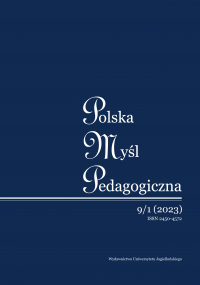O TRAGIZMIE CNOTY ZADUFANEJ. ANALIZA ESTETYCZNO-ETYCZNYCH ASPEKTÓW PEDAGOGIKI TRAGICZNEJ HENRYKA ELZENBERGA. CZĘŚĆ II
THE TRAGEDY OF SELF-RIGHTEOUS VIRTUE: ANALYSIS OF THE AESTHETIC AND ETHICAL ASPECTS OF HENRYK ELZENBERG’S TRAGIC PEDAGOGY. PART II
Author(s): Tomasz DrewniakSubject(s): Social history, History of Education, Sociology of Education, Pedagogy
Published by: Wydawnictwo Uniwersytetu Jagiellońskiego
Keywords: the art of suffering; Brutus; virtue; spiritual fatherhood; heroism; sacrifice;
Summary/Abstract: The paper is a continuation of the analysis of the basic aspects of Henryk Elzen- ber’s tragic pedagogy. The confrontation with the tragic nature of existence, and therefore with the destruction of what is beautiful and good, serves in Elzenberg’s conception of shaping the moral character by renouncing lower values, up to sacrifice, devotion to the highest values. Thus, suffering activates the moral, creative and cultural potential of an individual and a community. The moral limitations of Brutus, ranging from the stoic ideal of steadfastness in the face of suf- fering, through blindness in loving a (dis)friend and the republic, to intellectualism and naive faith in the superiority of virtue over the pragmatic logic of the struggle for power, reflect the tension between duty and existence, moral imperative and efficiency. Homo ethicus differs es- sentially from homo politicus and is doomed to failure in political rivalry, and at the same time its heroism lies at the basis of memory and collective identity. Culture is based on honoring the losers and those who gave their lives for the ‘cause’ because in them an extreme dedication to values is manifested. The author, in reference to Polish Christian thought (S. Wyszyński), indi- cates the possibility of extending the Elzenberg’s concept of the hero, inspired by Greco-Roman themes and the Polish insurgent tradition, with practical rationality, arising from embedding in a real genealogical line, the ability to critically assimilate tradition, affirmation of one’s own imperfections and imperfections in the world, to valor and self-sacrifice in everyday practices. The sanctity of heroism exceeds the dimension of self-centered ‘care for the soul’ and heroicpatriotism, becoming sacrifice for others in the service of others.
Journal: Polska Myśl Pedagogiczna
- Issue Year: 1/2023
- Issue No: 9
- Page Range: 167-184
- Page Count: 18
- Language: Polish

